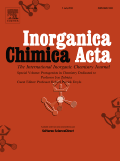
INORGANICA CHIMICA ACTA
Scope & Guideline
Pioneering Research in Inorganic and Materials Science
Introduction
Aims and Scopes
- Synthesis and Characterization of Metal Complexes:
The journal primarily publishes research on the synthesis and characterization of metal complexes, including their structural, electronic, and magnetic properties. - Coordination Chemistry and Metal-Organic Frameworks (MOFs):
A significant focus is on coordination chemistry, particularly the design and application of metal-organic frameworks (MOFs) for various applications, including catalysis and sensing. - Bioinorganic Chemistry:
Research exploring the interactions of metal complexes with biological systems, including studies on their anticancer and antimicrobial properties. - Catalysis and Reaction Mechanisms:
The journal features studies on catalytic processes facilitated by metal complexes and the investigation of their reaction mechanisms. - Environmental Applications:
Research on the use of inorganic materials and metal complexes in environmental applications, such as pollutant degradation and ion sensing.
Trending and Emerging
- Green Chemistry and Sustainable Catalysis:
There is an increasing focus on sustainable practices in synthesis and catalysis, including the development of environmentally friendly methods and recyclable catalysts. - Nanotechnology and Nanomaterials:
Emerging research on the synthesis and application of nanomaterials, particularly metal nanoparticles and their composites, is trending, especially in catalysis and sensing. - Fluorescent and Chemosensor Development:
The journal has seen a rise in studies focusing on the development of fluorescent probes and chemosensors for environmental monitoring and biomedical applications. - Hybrid Materials and Multifunctional Systems:
Research on hybrid materials that combine inorganic components with organic or biological elements is becoming increasingly prominent, reflecting a trend towards multifunctional applications. - Computational Chemistry and Theoretical Studies:
The integration of computational methods to predict properties and reactivities of inorganic compounds is gaining traction, aiding in the design of novel materials and catalysts.
Declining or Waning
- Traditional Organometallic Chemistry:
There has been a noticeable decline in traditional studies focused solely on organometallic chemistry, particularly those that do not integrate modern applications or interdisciplinary approaches. - Inorganic Solid-State Chemistry:
Research solely dedicated to the solid-state synthesis of inorganic materials has become less prominent, as more emphasis is placed on functional applications and hybrid materials. - Classical Coordination Compounds without Novel Applications:
The publication of studies on classical coordination compounds without novel insights or applications has decreased, reflecting a shift towards more innovative and applicable research.
Similar Journals
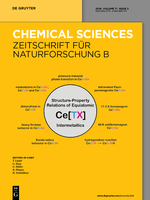
ZEITSCHRIFT FUR NATURFORSCHUNG SECTION B-A JOURNAL OF CHEMICAL SCIENCES
Exploring the Frontiers of Chemical Research Since 1947ZEITSCHRIFT FUR NATURFORSCHUNG SECTION B-A JOURNAL OF CHEMICAL SCIENCES is a distinguished scholarly journal published by Walter de Gruyter GmbH, based in Berlin, Germany. Since its inception in 1947, this journal has served as a vital platform for the dissemination of innovative research and findings in the field of chemical sciences. With an ISSN of 0932-0776 and E-ISSN of 1865-7117, it is indexed in prominent databases, reinforcing its credibility and accessibility for researchers and professionals alike. Currently categorized in the third quartile (Q3) in the field of miscellaneous chemistry according to 2023 assessments, it holds a significant position in the landscape of chemical research, ranking 270th out of 408 in general chemistry with a percentile standing of 33%. Although not an Open Access publication, its rigorous peer-review process ensures the publication of high-quality articles that contribute to advancing knowledge and innovation in chemistry. The journal’s commitment to scientific excellence makes it an essential resource for students and professionals seeking to stay updated with the latest developments in chemical sciences.

RUSSIAN JOURNAL OF COORDINATION CHEMISTRY
Exploring the Nexus of Metal and MoleculeThe Russian Journal of Coordination Chemistry, published by Pleiades Publishing Inc, stands as a significant contribution to the field of coordination chemistry, focusing on the intricate relationships between metal ions and organic molecules. With an ISSN of 1070-3284 and an E-ISSN of 1608-3318, this journal has been curating high-quality research since its inception in 1996. Though it currently does not offer open access, the journal plays a crucial role in disseminating innovative findings, evidenced by its Q3 ranking in both Chemical Engineering and Chemistry categories as of 2023. With Scopus rankings placing it in the 40th percentile among general chemistry and chemical engineering journals, it demonstrates a commitment to advancing knowledge in these vital areas. The journal invites researchers, professionals, and students alike to engage with its comprehensive articles that explore both theoretical and practical aspects of coordination chemistry, supporting the development of new applications and techniques within the field.

Chemistry-Switzerland
Empowering Innovation Across Chemistry DisciplinesChemistry-Switzerland is an esteemed, fully Open Access journal published by MDPI, dedicated to advancing research in a broad spectrum of chemistry disciplines. Launched in 2019, the journal has established itself within the academic community, particularly as it spans critical areas such as inorganic and organic chemistry, as well as electrochemistry. Recognized for its contributions, it has achieved notable rankings, including Q2 status in Chemistry (miscellaneous) and Inorganic Chemistry, and Q3 standing in Electrochemistry and Organic Chemistry for 2023. With a commitment to disseminating high-quality research, Chemistry-Switzerland serves as an invaluable resource for researchers, professionals, and students aiming to share their discoveries with a global audience. Located in Basel, Switzerland, this journal facilitates seamless access to cutting-edge research, fostering innovation and collaboration within the vibrant field of chemistry. With this dynamic platform, the journal aims to continue its trajectory of growth and impact, inspiring the next generation of chemists.
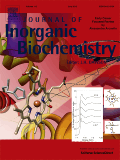
JOURNAL OF INORGANIC BIOCHEMISTRY
Fostering Innovation in Inorganic Biochemistry ResearchJOURNAL OF INORGANIC BIOCHEMISTRY, published by Elsevier Science Inc, is a pivotal journal dedicated to exploring the intricate intersections of biochemistry and inorganic chemistry. With an ISSN of 0162-0134 and an E-ISSN of 1873-3344, this esteemed journal has been a key resource since its inception in 1979, converging its insights through impactful research projections until 2024. Currently ranked #18 out of 79 in Inorganic Chemistry, placing it in the 77th percentile, and #144 out of 438 in Biochemistry, at the 67th percentile, the journal showcases a diverse array of studies that contribute significantly to understanding the roles of inorganic compounds in biological systems. Although it does not offer open access, the journal remains integral in fostering rigorous academic discourse among researchers and professionals keen on advancing the field. With a Category Quartile ranking of Q3 in Biochemistry and Q2 in Inorganic Chemistry, it serves as a critical platform for scholars aiming to disseminate cutting-edge findings and stimulate scholarly engagement in this dynamic area of study.
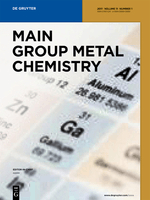
MAIN GROUP METAL CHEMISTRY
Advancing Knowledge in Metal InteractionsMAIN GROUP METAL CHEMISTRY, published by De Gruyter Poland Sp. z o. o., is an esteemed open access journal that has made a significant impact in the fields of Chemistry, Condensed Matter Physics, and Materials Science since its inception in 1988. With its ongoing publication aimed at advancing scholarly discourse until 2024, this journal is indexed in leading databases and has earned a diverse readership due to its rigorous peer-review process and relevant contribution to the understanding of metal chemistry. In the 2023 category quartiles, it has been recognized as Q2 in Metals and Alloys and holds Q3 rankings in Chemistry (miscellaneous), Condensed Matter Physics, and Materials Chemistry, showcasing its interdisciplinary appeal and recognition in the scientific community. The journal's innovative open access model, implemented in 2019, enhances visibility and accessibility for researchers worldwide, fostering collaboration and discovery among professionals, students, and academics alike. By presenting high-quality research and critical reviews, MAIN GROUP METAL CHEMISTRY serves as a vital resource for those seeking to deepen their understanding of metal interactions and their applications in advanced materials.
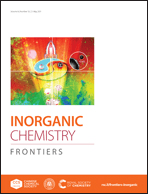
Inorganic Chemistry Frontiers
Pioneering Research in Inorganic ChemistryInorganic Chemistry Frontiers, published by the esteemed Royal Society of Chemistry, stands at the forefront of advancements in the field of inorganic chemistry, boasting a prestigious Q1 ranking in its category as of 2023 and an impressive Scopus Rank of #3 out of 79, placing it in the 96th percentile. Since its inception in 2014, this journal has provided a robust platform for high-quality research that spans the diverse and rapidly evolving areas of inorganic chemistry. As an open-access journal, it ensures that the findings presented are readily accessible to researchers, educators, and practitioners globally, fostering an inclusive environment for the dissemination of knowledge. With its rigorous peer-review process, Inorganic Chemistry Frontiers aims to facilitate interdisciplinary dialogue and innovation, making it an essential resource for anyone dedicated to exploring the myriad applications and theoretical advancements within inorganic chemistry.

TRANSITION METAL CHEMISTRY
Exploring the Frontiers of Inorganic InnovationTransition Metal Chemistry is a distinguished journal published by Springer, focusing on the latest advancements in the field of inorganic chemistry, materials science, and metals and alloys. With an impressive publication history dating back to 1975, this journal serves as an essential platform for researchers and professionals seeking to explore the complexities and innovations in transition metal chemistry. Transition Metal Chemistry holds a Q4 ranking in Inorganic Chemistry and positions itself in Q3 within both Materials Chemistry and Metals and Alloys categories, highlighting its evolving influence in these domains. With a Scopus ranking of #41 in Inorganic Chemistry and #56 in Materials Science, it provides readers with valuable insights into research trends and discoveries. Although it does not offer open access, its rigorous peer-review process ensures that only the most impactful and validated studies are published. By bridging theoretical concepts and practical applications, Transition Metal Chemistry plays a pivotal role in advancing scientific knowledge, attracting a diverse audience of researchers, students, and industry professionals committed to unraveling the complexities of transition metals.

HELVETICA CHIMICA ACTA
Pioneering Insights in Biochemistry and BeyondHELVETICA CHIMICA ACTA, published by WILEY-V C H VERLAG GMBH, stands as a pivotal journal in the fields of chemistry and chemical research. Established in 1918, this esteemed journal spans a diverse array of topics, including biochemistry, catalysis, drug discovery, inorganic and organic chemistry, as well as physical and theoretical chemistry. With influence reflected in its noteworthy Q2 and Q3 quartile rankings across these categories as of 2023, HELVETICA CHIMICA ACTA continues to capture the interest of the global scientific community. Although not an open-access journal, it remains accessible through various academic institutions, ensuring broad reach and collaboration opportunities. Researchers, professionals, and students alike will find its meticulously peer-reviewed articles critical for advancing knowledge and fostering innovation within the chemical sciences. As the journal converges toward 2024, it remains committed to publishing high-quality, impactful research that supports the evolution of chemistry across its multifaceted disciplines.

CHINESE JOURNAL OF STRUCTURAL CHEMISTRY
Advancing the Frontiers of Structural ChemistryThe CHINESE JOURNAL OF STRUCTURAL CHEMISTRY, published by Elsevier, stands as a vital resource in the field of structural chemistry, notably contributing to the advancement of knowledge since its inception in 1996. With its ISSN 0254-5861 and E-ISSN 0254-5861, the journal has established a firm reputation, garnering a Q2 ranking in the 2023 Chemistry (miscellaneous) category, which highlights its influence in the academic community (rank #155/408, 62nd percentile in Scopus). This journal serves as an invaluable platform for researchers and professionals by disseminating high-quality research findings, theoretical studies, and applied methodologies that address both fundamental aspects and emerging trends in structural chemistry. With contributions from distinguished scholars, it aims to foster innovation and collaboration, while providing a space for novel discoveries in the field. Although it does not currently offer Open Access, its robust content continues to attract a diverse readership eager to engage with cutting-edge scientific developments.

RUSSIAN JOURNAL OF INORGANIC CHEMISTRY
Pioneering Research in the World of InorganicsThe Russian Journal of Inorganic Chemistry is a distinguished publication that delves into the fundamental and applied aspects of inorganic chemistry. Published by MAIK Nauka/Interperiodica/Springer, this journal has established itself as a vital resource for researchers, professionals, and students alike, contributing significantly to the fields of Inorganic Chemistry, Materials Science, and Physical and Theoretical Chemistry. With an ISSN of 0036-0236 and an E-ISSN of 1531-8613, the journal is indexed for easy access and citation. Though the journal currently operates under a subscription model, its commitment to disseminating high-quality research and fostering scientific discourse remains steadfast. The journal has been maintaining a consistent record since its inception, and its positioning in the Q3 quartile across various chemistry categories in 2023 underscores its relevance in the academic community. As it continues through its converged years from 1996 to 2024, the Russian Journal of Inorganic Chemistry plays a pivotal role in enhancing the understanding and advancement of inorganic chemistry, making it an indispensable tool for anyone engaged in this dynamic field.